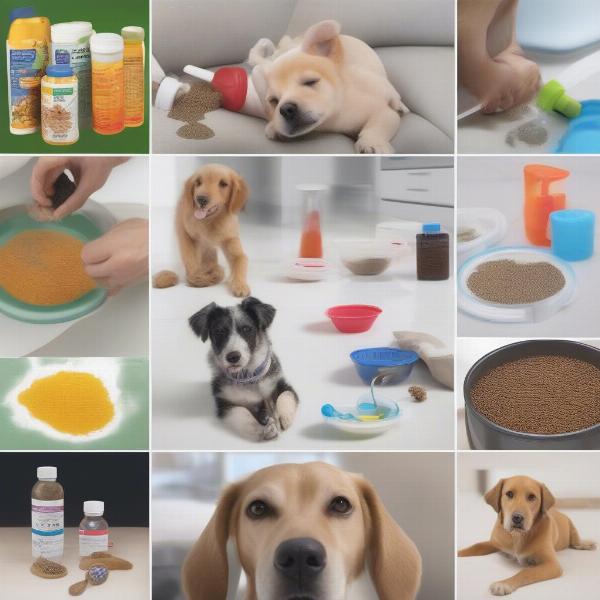Dogs eating poop, also known as coprophagy, is a surprisingly common behavior that can be alarming and unpleasant for owners. While it may seem disgusting to us, it’s important to understand that this behavior is often instinctive and can even be normal in some cases, particularly for puppies and mother dogs. This article will explore the reasons behind coprophagy, the potential risks involved, and how to address this behavior in your canine companion.
Why Do Dogs Engage in Coprophagy?
There are several reasons why dogs might eat poop, ranging from medical to behavioral.
Medical Reasons for Coprophagy
- Malabsorption: If a dog isn’t absorbing nutrients properly, they might be drawn to feces as a way to try and recoup lost nutrients. Conditions like exocrine pancreatic insufficiency, inflammatory bowel disease, and intestinal parasites can lead to malabsorption.
- Nutritional Deficiencies: A lack of essential vitamins and minerals in a dog’s diet can also trigger coprophagy. This is less common with commercially available dog foods that are formulated to meet a dog’s nutritional needs.
- Certain Medications: Some medications can increase appetite and potentially lead to coprophagy as a side effect.
Behavioral Reasons for Coprophagy
- Puppy Behavior: Puppies often explore their environment through their mouths, and this includes tasting feces. This behavior is usually outgrown by the time they reach adulthood.
- Maternal Instinct: Mother dogs will often clean up their puppies’ waste by consuming it, especially during the first few weeks of their lives. This is an instinctive behavior to keep the nest clean and protect the vulnerable puppies from predators attracted by the scent.
- Anxiety or Stress: Stressful situations, such as being left alone for long periods, changes in routine, or a new environment, can trigger coprophagy in some dogs.
- Boredom: Dogs that are bored or lack sufficient mental and physical stimulation may engage in coprophagy as a way to occupy themselves.
- Attention-Seeking Behavior: In some cases, a dog may have learned that eating poop gets a reaction from their owner, even if it’s a negative one. This can reinforce the behavior.
The Risks of Coprophagy
While coprophagy itself might not always be harmful, it does carry the risk of transmitting parasites and other harmful bacteria.
- Parasites: Feces can contain intestinal parasites like roundworms, hookworms, and whipworms. If a dog ingests infected feces, these parasites can infest them, leading to various health problems.
- Bacteria and Viruses: Harmful bacteria like E. coli and Salmonella can also be present in feces, potentially causing gastrointestinal upset and other infections.
How to Stop Coprophagy in Dogs
Addressing coprophagy involves identifying the underlying cause and implementing appropriate strategies.
- Veterinary Checkup: A visit to the veterinarian is crucial to rule out any underlying medical conditions.
- Dietary Adjustments: Ensure your dog is receiving a complete and balanced diet that meets their nutritional requirements.
- Environmental Management: Clean up feces immediately after your dog eliminates. This is especially important for puppies and dogs with coprophagic tendencies.
- Behavioral Modification: Training techniques such as positive reinforcement and redirection can be effective in discouraging coprophagy.
- Enrichment and Exercise: Provide your dog with plenty of mental and physical stimulation to prevent boredom. This can include interactive toys, puzzles, and regular walks or playtime.
- Taste Deterrents: Products are available that can be added to food or directly to feces to make them less appealing to dogs.
 Dog eating poop – solutions
Dog eating poop – solutions
Conclusion
Coprophagy, while unpleasant, is a behavior that can often be managed with the right approach. By understanding the potential causes and implementing preventative strategies, you can help your dog break this habit and maintain their health and well-being. Remember to consult with your veterinarian to rule out any underlying medical conditions and discuss the best course of action for your furry friend.
FAQ
- Is coprophagy always a sign of a medical problem? No, while it can be a symptom of certain conditions, it’s also often a behavioral issue, especially in puppies.
- Can coprophagy be harmful to my dog? Yes, it can expose your dog to parasites and harmful bacteria.
- What should I do if my dog is eating poop? Schedule a vet appointment to rule out medical issues and discuss behavioral modification strategies.
- Are there any products that can help deter my dog from eating poop? Yes, taste deterrents are available.
- How can I prevent my dog from developing coprophagy? Provide a balanced diet, plenty of exercise, and promptly clean up feces.
About ILM Dog
ILM Dog (ilmdog.com) is your trusted international source for expert dog care advice. From breed selection and puppy care to senior dog health, nutrition, training, and grooming, we offer comprehensive resources to help dog owners around the world provide the best possible care for their furry companions. Our team of experienced writers and dog experts are dedicated to bringing you reliable, practical information on every aspect of dog ownership. For personalized advice, product recommendations, or any dog-related questions, contact us at [email protected] or +44 20-3965-8624.